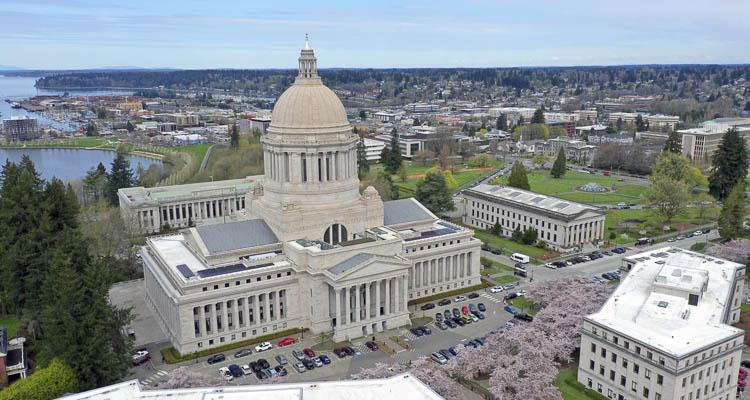
The measures were advanced under Washington’s direct-democracy initiative law, which allows the people to propose bills to the legislature for consideration
Paul Guppy
Washington Policy Center
One of the most common sentiments heard these days is that elected officials don’t listen to us. That’s not the case, however, with three popular initiatives the legislature passed recently by large bipartisan margins, moving our state forward in rebuilding trust in our public institutions.

The measures were advanced under Washington’s direct-democracy initiative law, which allows the people to propose bills to the legislature for consideration. Each proposal garnered over 430,000 signatures, or at least 100,000 more than each one needed to qualify.
First to pass was Initiative 2111, to ban state and local income taxes. The proposal grew out of popular concern after lawmakers passed, and vigorously defended all the way to the U.S. Supreme Court, the state’s first-ever income tax on capital gains. It doesn’t take much imagination to see that, unless stopped, a future legislature would quickly expand this “high-earners” tax to the rest of us.
Easy passage of Initiative 2111 again confirmed that few political ideas are less popular in our state than an income tax. Voters have rejected it 10 times, most recently in 2010 by a crushing 64%. An income tax is about as popular here as a COVID-era school closure, and now the ban ensures that state and local politicians, if they’re smart, will go nowhere near it.
Next to pass was Initiative 2081, to establish parental rights in public schools. At one time school officials dealing fairly with parents was taken as a given. No longer. Practices like mandating sexualized curriculum, infusing Critical Race Theory into daily lessons, violating student privacy, and hiding sensitive medical information from parents has badly eroded the once-dependable reputation of public education.
The intent of Initiative 2081 is to restore the community’s trust in schools by requiring that officials be honest with parents. The measure requires schools to work closely with parents as educational partners, rather than perceiving them as a threat to a cultural agenda promoted by radical school officials.
Interestingly, conservative rural and suburban Republicans were joined by their far-left urban colleagues in voting for the measure. The bipartisan agreement will go a long way in alleviating the deep-seated wariness many parents experience when school officials treat them in a dismissive or deceptive way.
Lastly, lawmakers passed Initiative 2113, to restore the ability of the police to pursue criminals. A bill passed in 2021, HB 1054, banned most police pursuits and predictably led to a massive spike in crime. One fleeing criminal called 911 to complain that the police were following him. “It’s a violation of 1054 – he’s not allowed to chase me,” the lawbreaker complained.
In another example, Seattle police watched helplessly as burglars pulled out of the parking lot of a small business they had just robbed and drove away.
Passage of Initiative 2113 restores the ability of police to gather information and conduct normal criminal investigations. It allows police to do their jobs, by pursuing and arresting suspects based on reasonable evidence. The result will be the promotion of justice and safer streets for everyone.
All three measures will become law in 90 days; they don’t require the governor’s signature.
On a discouraging note, legislative leaders refused to take up three other citizen-led initiatives. These are proposals to repeal the hidden gas tax (I-2117), to repeal the capital gains income tax (I-2109), and to allow workers to opt-out of the long-term care payroll tax (I-2124). Instead, the outcome of these ballot measures will be decided by voters in the November election.
The central principle of democracy is respecting the will of the people, especially in support of bipartisan ideas that work and enjoy broad popular backing. That is why swift passage of these three citizen initiatives is so encouraging. Let’s hope that on other policy issues elected officials respond just as positively to the will of the people they represent.
Paul Guppy is the vice president for research at the Washington Policy Center.
Also read:
- Leslie Lewallen officially files for re-election to Camas City CouncilLeslie Lewallen launches her re-election campaign for Camas City Council, highlighting key accomplishments and a continued focus on community priorities.
- Letter: ‘Something is wrong when our vote means nothing’Bob Zak challenges the political handling of the I-5 Bridge project and urges voters to demand accountability.
- Letter: ‘This is a time for bold leadership, clear advocacy, and strong representation’Justin Forsman of Vancouver announces his candidacy for mayor and outlines a bold new platform focused on rights, infrastructure, and local governance.
- Opinion: Schools notifying parents about the kinds of care kids can decide on their own didn’t make itElizabeth New criticizes the removal of Amendment 1164 from current legislation, arguing it leaves parents uninformed about health care services accessed by their children through schools.
- Ridgefield School District invites community to help shape new Strategic PlanRidgefield School District is hosting three public sessions to gather community input for its new Strategic Plan.
- Julianne Lawrence is first paid director of Two Rivers Heritage MuseumJulianne Lawrence has been appointed the first paid director of the Two Rivers Heritage Museum following a strategic effort by the Camas-Washougal Historical Society.
- Foundation for Vancouver Public Schools breaks ground on new building to support construction trades at Fort Vancouver High School with the Ed and Dollie Lynch FundFort Vancouver High School will soon be home to a donor-funded trades center focused on welding and advanced manufacturing education.











